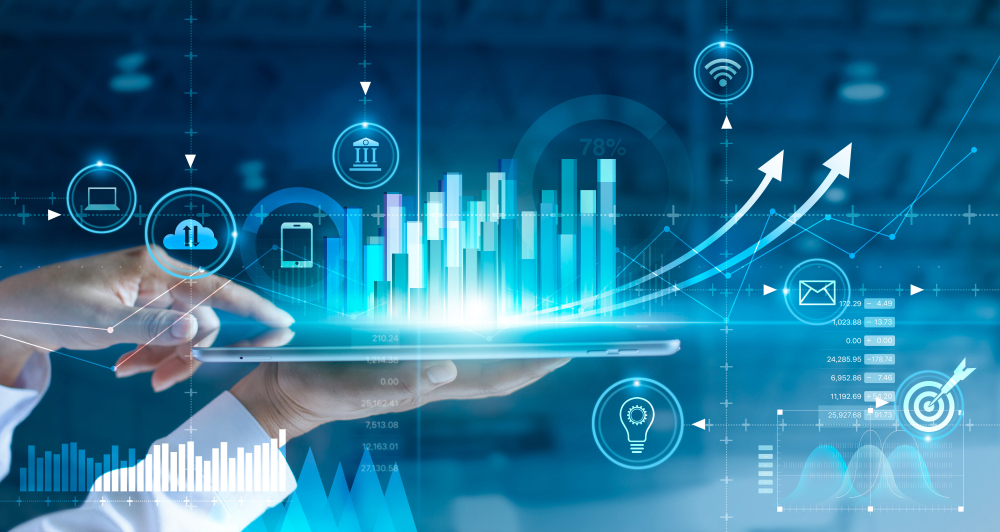
The global economy is transitioning into a data-led economy, fueled by an increasing number of digital touchpoints, data capture mechanisms, personalized consumer experiences and cloud adoption. Data holds the key to driving strategic business transformation, whether through the adoption of newer business models or through the use of data to drive efficiencies and cost-optimization.
Data is enabling the use of a new set of lenses to transform the entire business value chain and with it the way we perceive everything from human interactions to business processes. Digital innovation is key to unlocking the potential data holds for Indian businesses, the economy and for the average consumer.
Newer business models for the data age
Businesses have steadily been building channels to gather more consumer and operational data; which sets them up to explore new business models for optimal topline growth. A fitting example of this is that of telco giants venturing into digital services such as the digital marketing and advertising due to two key factors. One is their insights on customer engagement and product performance that data analytics has generated and the second is their best-in-class network capabilities. Consequently, these companies have gone on to position themselves as a marketing platform, with a wide yet personalized consumer outreach for a diverse set of brands. From FMCGs to digital startups, brands across the spectrum are now getting a chance to initiate engaging and impactful digital ad campaigns that drive home the brand message to the most relevant customer cohorts. Today newfound digital advertisers are taking building relationships with customers seriously and have taken it to a whole new level. The basis for this has been transparency and trust. For example – Customers today receive advertisements only from brands, that they prefer to look at regularly at or buy and not the ones that they don’t.
The ‘Super Apps’ business model is another important outcome of data. While several businesses provide single app facilities to ease customer engagement, Super Apps have upgraded the entire process of user engagement. The idea of providing one app for multiple services such as booking a ride, payments, hotel booking, food delivery etc., is a win-win for all, especially in a large trillion-dollar digital economy like India. While consumers get to fulfill the many needs of their digital-led lifestyle all in one single app, businesses get an opportunity to expand their revenue streams by reaching out to quality consumers. In fact, Super Apps are proving to be an economical solution and if used well, they could bring about a transformation of emerging segments such as online food delivery platforms, e-commerce, e-payments, e-learning, together among others. Some of India’s largest conglomerates are taking this route to service the Indian population.
Furthermore, adoption of data and AI capabilities is transforming the business model of banking and various other financial institutions. Today, it is all about targeted product marketing, as a one-size fits all approach may not be feasible . AI empowers these organizations to cater to the personalized real-time financial needs such as insurance, Loans, Credit cards etc., based on the consumers’ credit worthiness, which sometimes changes dynamically. Old ways of scoring the customer are not enough to render these products and services. Those offering an enhanced customer experience and effective decision making based on insights from calculating consumer behaviour using AI, stand to get a competitive advantage, over those that still follow the traditional business model.
At a time when consumer preferences are massively transforming, improving customer experience can be an effective pathway for long-term revenue generation. Today’s consumer is always pressed for time and usually craves instant gratification while buying any products and/or services. For instance, many of them prefer to have a cashless shopping experience no matter where or what they are buying. While e-payments platforms have already elevated customer experience to a large extent, a cashier-less offline shopping experience, is the future of consumer convenience. Some e-commerce giants have already set up stores, where all a customer needs to do is scan a QR code at the entrance of a store, pick the products of their choice and walk out, thus eliminating the long queues at the cash counter.
As the consumers’ digital universe continues to expand, businesses, especially those that offer subscription services can shape their marketing and sales pitch using either cross selling or upselling techniques for personalized product offerings. These are based on smart analytics of the consumer preferences and interests.
Bottomline growth
Manufacturing is at the core of several businesses. That any hindrance in this activity can fracture a business became even more evident during the pandemic-induced lockdown early last year. Enhancing or maintaining manufacturing activity with data analytics and AI will have a long-term impact that can serve well even during an unprecedented crisis.
As an example, predictive maintenance for manufacturing has a clear business benefit. This is because it enables real-time monitoring of asset condition along with the environmental, and/or operational data with smart analytics to detect, assess, and alert of impending problems. The most important benefit is that it prevents any undue outage of machinery. What makes it an economical proposition is the lowered cost of technologies such as IoT, cloud platforms, microservices for analytics, and wireless sensors.
A well-oiled and cost-saving manufacturing system also requires asset optimization. Industries such as cement, steel, automobile, etc., that use heavy machinery need AI technologies to streamline energy consumption, upgrade production quality and improve overall operational capabilities at the plant.
Running data-led supply chains, inventories, distribution and delivery operations can give companies, especially retailers of all kinds a chance to enhance these key business functions and that too with appropriate cost optimization.
Lastly, given its unlimited potential, data will continue to enable critical decision-making and soon evolve into the game changer for many sectors and businesses. Organizations that recognize the value of data and view it as a corporate asset early, are poised to lead the new data age.



